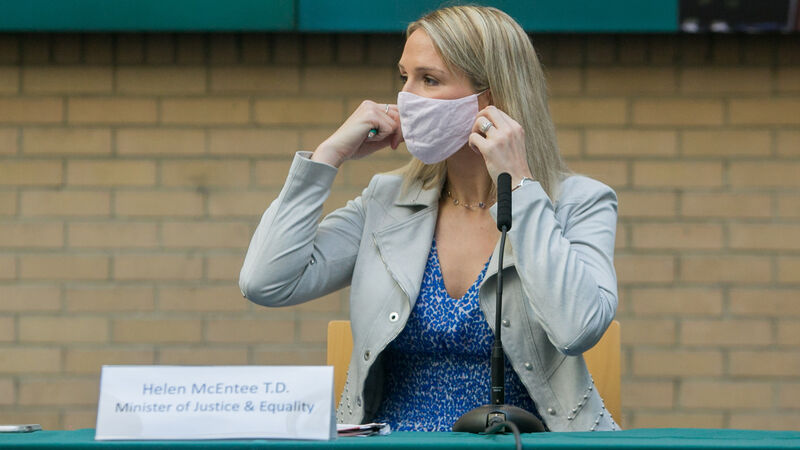McEntee: Interrogation of rape complainants is up to judges

Helen McEntee says the plan will help victims or witnesses in sexual violence cases, and says the ban is "something we want to explore". Picture: Gareth Chaney/Collins
The Minister for Justice has defended not banning the interrogation of rape complainants on their sexual history.
Launching her new recommendations for the justice sector, Supporting The Victim's Journey, on RTÉ's Morning Ireland, Helen McEntee says the plan will help victims or witnesses in sexual violence cases, and says the ban is "something we want to explore".
"This is something that we're always wanting to explore but this is very much a decision that has to be taken by the judge at the time, I can't decide," she said.
"I've left this implementation plan an open document so we have very few recommendations with timelines.
"This is going to be a live document that we can add and take away but when it comes to this very specific question, it's for a judge to decide whether or not evidence can or cannot be accepted.
"There are very clear rules, very clear guidance when it comes to what can be asked of a victim when it relates to their sexual history and their past and that's very clearly there and Tom O'Malley and his recommendations and his report outlined this as well and that's why the specific recommendation wasn't made."
Currently, where a defence essentially wants to raise the complainant's sexual history, legal teams must flag this to the judge early on in a pre-trial hearing, and the judge decides whether or not they will allow it.
This is the only part of the trial where a complainant would have additional legal support at the same level as the defence, for example: senior counsel, but only for that finite period of the trial.
Ms McEntee said the implementation plan is "taking a much more holistic approach" to victims, which includes counselling and training for Gardai, legal services teams and judiciary.
"What we're not changing here is giving a witness, the person who was the victim of the crime, their own separate legal representation and that's because you already have the prosecution and you already have defence," she said.
"This is to try and support that vulnerable person in particular when it comes to very difficult discussions that they may have or questions that may be raised whether it's around their past or around their sexual history which are questions that do arise in these incidents.
Founder and Head of the Sexual Violence Dept of the Victims Alliance, Linda Hayden says: “The announcement of these measures is a great step forward, however there are more things we would like to see, like legal representation for victims in court, minimum mandatory staffing hours for DPSU units and establishment of a Victim’s Commissioner similar to what is in place in the UK.
"There is more work to be done to ensure that victims are at the heart of everything the justice system does, but this is a great starting point and the levels of investment and training that have been committed to, should ensure a solid base for this work.”





